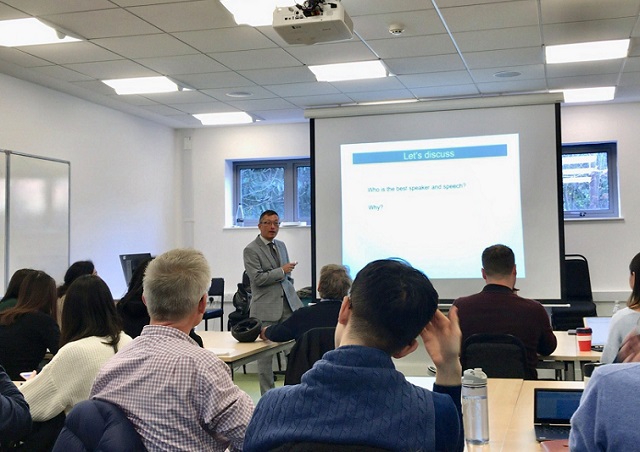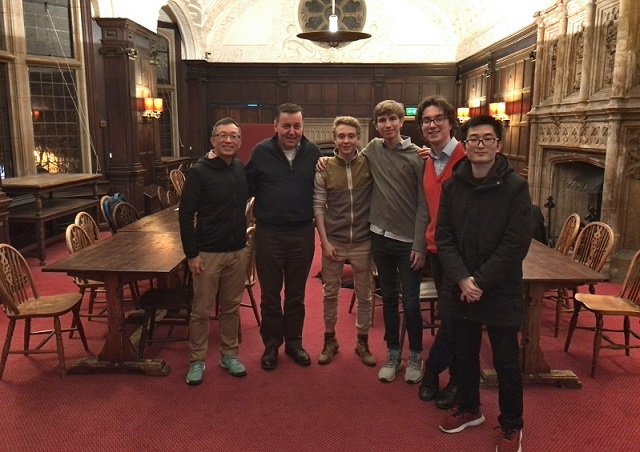PickUP
Hosei's Research Brand vol.4] Presentation Skills and Academic Writing Important in Communication Strategies for Global Business (Professor NAKATANI Yasuo, Department of EconomicsFaculty of EconomicsDepartment of Economics )
- January 20, 2021
Hosei's Research Brand" Series
At Hosei University, fascinating and stimulating research is being produced every day that will be the frontrunners in the future of society and the world.
This series of articles and videos will tell the story of Hosei's brand of research.
There is a theory behind communication strategies in business.
Until now, communication strategy (CS), or presentation and negotiation in business, has been based on the experience of professional managers. While evidence is essentially required when analyzing economic and managerial events, I have expanded my research field from economics to applied linguistics to provide linguistic evidence for CS in business and to show concrete measures to improve it.
I also advocate the importance of "academic writing" because communication in business is not limited to oral presentations, but often takes place through documents, proposals, contracts, and other papers.
Therefore, I am conducting research to contribute to the improvement of CS for global leaders by conducting "corpus analysis," using actual presentation videos, business letters, and other materials to analyze the large volume of language used in such materials. In other words, we explore ways to actually persuade others, analyze past successful patterns, and establish them as theories to increase the success rate.
Currently, several crises are being pointed out with regard to language in Japan. For one thing, we are experiencing the spread of media such as SNS, where anyone can easily and casually send out messages, and communication can be established without using many words. However, in actual business negotiations and international meetings, a wealth of background knowledge is necessary in addition to language. Unfortunately, in Japan, the amount of reading has been greatly reduced and there is a lack of quality input as knowledge.
For example, British universities still place great importance on having students read books. Students are aware that they are the leaders who will open up the future of society, and they are always asking "Why? and continue to read and discuss books critically. I became a research fellow at Oxford University and also belonged to a debating group called "Oxford Union. Here, in addition to reading, I listen to lectures by the world's great leaders and practice critical thinking in response to them, thereby polishing my own words. Unfortunately, such opportunities are not easy to come by at Japanese universities, and there is a sense of crisis that Japan is being left behind by the rest of the world as students read less and less.
-

Lecture on business presentations at a public seminar at the Oxford University Graduate School of Education
-

A workshop given by the world champion of the Oxford Union, the world's premier debating organization established in 1825. British Prime Ministers Churchill, Cameron, May, Johnson, and others competed in debates here.
Human resources required by Japanese companies that are expanding their markets globally
In the past, Japanese companies that mainly targeted the domestic market were completed by "A-Un," Japanese people understanding each other. Now, however, traditional Japanese companies are also relying on overseas markets for much of their sales. A decade ago, students with a desire to work overseas would aim for trading companies or foreign-affiliated firms. Nowadays, regardless of their aspirations, more and more companies require them to communicate in English when they enter the company.
Certainly, Japanese is a language with wonderful features that allow us to understand the feelings of others, respect their background and culture, and convey our feelings with few words. However, if the place in the future business is not Japan, personnel who can communicate appropriately in English will be needed to lead organizations in the global marketplace.
Furthermore, in the actual business world, a poorly written contract can be fatal and carry the risk of litigation. Therefore, English must be accurate, not just somewhat understandable.
Given this background, it is important for students to have experience thinking and discussing in English. To this end, I am working to make the "case studies" used in Western business schools more accessible to undergraduates by creating English teaching materials using familiar corporate cases and holding discussions based on these case studies. University is a place where free and lively discussions can take place without fear of failure. That is why we must make it a place where top-notch discussions can take place. It is also important to invite top-notch managers to interact with us and feel the difference between us and them through their words and practices. It is important for them to have a sense of what they are lacking and what they would do if they were the one in charge through various cases. In the Faculty of Economics, we are putting this approach into practice in the form of a joint seminar of volunteers.
Another thing I would like university students to try is to practice writing academic papers over the course of four years and write a graduation thesis as the culmination of this practice. In other words, we want them to acquire academic writing skills. In the business world, precise and logical language is a weapon. There have been many excellent practitioners in Japan, but not many have the experience of writing academic papers to acquire global skills. I believe that university education = mastery of academic writing, and the mission of university faculty is to have students write their graduation theses. One thing in common among universities that produce world leaders is that they write well their theses. This is because how to train young people, who are expected to solve various problems that are piling up before our eyes regardless of the times, through "reading" and "writing" is the mission of university education from its origin through thesis writing.
Academic writing techniques are a weapon in the field of business

Before reaching the summit of the mountain, students will face various challenges and look for where they can find solutions to them. They develop their problem-solving skills through repeated training in search of solutions under the advice of faculty members. The small but valuable discoveries made over the course of four years are accurately conveyed to the world. This is the presentation. This is where CS comes into play. CS is also essential for writing papers, and for this reason, I have compiled written presentations into several books.
The analysis of a large corpus of languages introduced at the beginning of this article revealed that business leaders around the world use a common language in their English presentations. In part, they effectively used the vocabulary word "YOU" with a fairly high frequency and specific expressions strongly associated with it. This showed that they were always looking at the person in front of them, making judgments, thinking from their perspective, and suggesting actions that the audience should take. The next most commonly used word was "WE". There are two types of "WE" in English: exclusive WE and inclusive WE. The former is a generic term for the communicator, e.g., the company presenting the results, or the researchers, and does not include the audience. In contrast, the latter is a "we" that includes the audience in front of you, and when used, it means that it affects everyone in the audience. World leaders effectively utilize this inclusive WE to engage people. Unfortunately, when Japanese managers and leaders say "we," it is an exclusive "WE" that literally looks only at themselves.
Effective use of language for leaders was predicted in the writings of the Greek philosopher Aristotle. In my research, I was able to substantiate the theory numerically for the first time through a large amount of data validation with the help of computers. In other words, we now have scientific evidence regarding why, where, and how to use "YOU" and "WE," which good speechwriters unconsciously use to enhance their persuasive power.
As mentioned above, there is a theory behind the art of communicating. Now with the Corona Disaster, the way of communication has changed dramatically. But understand the other person and know their needs. Clarify what resources you have in response and communicate them. In these negotiations and discussions, the general theory of conveying one's intentions accurately and convincing others to move them remains unchanged. The only thing that changes is the approach of using different media. Certainly, online communication requires a different approach, such as speaking more clearly or using more facial expressions. New strategies will also be needed to figure out how to apply these to Theory.
The training in academic writing that you experienced during your college years will give you the ability to research to find what is not out there in the world on your own, identify the real problem, derive the solution from the wisdom of those who have gone before you, and actually solve it. Furthermore, it is common to the process of writing to communicate the results, a process that is carried out every day in business and international negotiations. I believe that as long as we have this ability, we will be able to survive no matter how chaotic the world becomes in the future.
Professor NAKATANI Yasuo, Department of EconomicsFaculty of Economics
B.A. in Faculty of Economics, Keio University; M.A. in Applied Linguistics, Macquarie University, Australia; Ph. Visiting scholar at Oxford University (2002, 2019); reviewer for major overseas journals including Journal of Business Communication. External examiner for graduate doctoral programs in Australia, New Zealand, and Malaysia. He is a member of Trustee International Association for Business Communication. Books Global Leadership: Case Studies of Business Leaders in Japan, Academic English Writing for University Students, How to Write English Papers for Economics and Business Administration, and many others.

